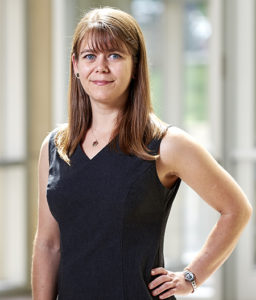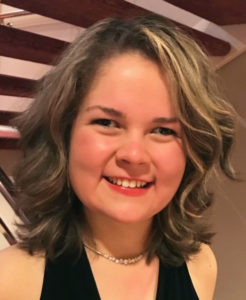For college students and faculty across the country, navigating the spring semester during a global pandemic proved to be a colossal adjustment. At the University of Tennessee, students left for spring break and returned to classes that had all been moved online.
For some, this transition was harder than others, but students and faculty in the nuclear engineering department persevered with the Volunteer Spirit to make sure students had what they needed to succeed to the best of their abilities and to create a sense of community when it was impossible to meet face to face.

Jamie Coble.
Assistant Department Head for Undergraduate Studies and Service, Associate Professor, and Southern Company Faculty Fellow Jamie Coble says that one way she helped maintain a sense of connection and community while social distancing was by opening Slack channels for her classes. Slack is a popular app that provides a simpler way for teams and groups to communicate quickly without the glut of emails and texts.
“The Slack workspace for our class has given us a space to extend academic conversations outside the Zoom classroom and has also given everyone opportunities to share pet photos, memes, and general check-ins,” Coble said. “The new department Slack has channels for students, researchers, and faculty to seek and give help on all kinds of technical topics, from general topics to specialized programming languages and computational tools.
“Opening new channels of communication has helped me get to know my students and others in the department in ways I wouldn’t have otherwise; it’s a welcome bit of connectedness in a time of isolation.”
Coble was also invited to speak at a virtual conference entitled “Working from Home—Lessons Learned,” hosted by US Women in Nuclear, which was attended by students in the department.
In it, she shared strategies that apply to working during the quarantine, such as creating asynchronous content (make use of existing content, such as related presentations on YouTube), using synchronous time to engage with students (working through examples, answering questions, taking time to check in with students on how they are coping), and opening new channels of communication using tools such as Slack and using Zoom for answering questions “in person” instead of through email.

Madison Allen
Nuclear engineering sophomore Madison Allen is one student who had a positive experience with the transition of classes online.
Allen has a visual impairment that necessitated that she receives PowerPoint files ahead of class lectures and enlarged text handouts. The transition to Zoom and Canvas for online learning actually saved a step for her because she could use computer software instead of enlarged text print copies.
In her freshman year, she gained experience working with Zoom as a visual aid during live class on campus in the Engineering Fundamentals Program with phenomenal help from Engineering Fundamentals Director, Professor Richard Bennett, as well as his team and UT’s OIT department.
“The Tickle College of Engineering and especially the Nuclear Engineering Department have been especially helpful at providing the necessary accommodations and visual aids for me to be successful,” she said. “This exposure to Zoom was especially helpful during my transition to online classes paired with my assistive technology. Regardless of the pandemic conditions, this technology has been outstanding to help eliminate barriers for visually impaired students whether the classes are online or on campus.”